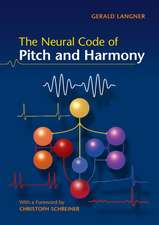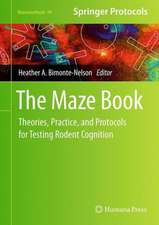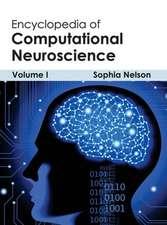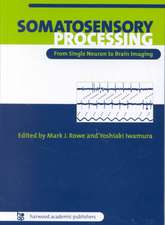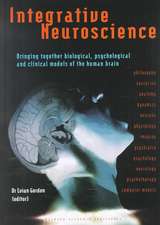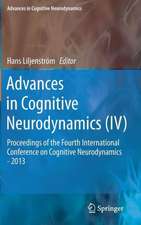Neurotechnology in National Security and Defense: Practical Considerations, Neuroethical Concerns: Advances in Neurotechnology
Editat de James Giordanoen Limba Engleză Paperback – 14 oct 2024
The book examines how developments in neurotechnology in national security and defense agendas are impacted by and affect ethical values and constructs, legal considerations, and overall conduct of the social sphere. Presenting an integrative perspective, leading international experts lay the scientific groundwork and establish the premises necessary to appreciate the ethical aspects of neurotechnology in national security and defense.
It is not a question of "if" neurotechnology will be used in such ways, but when, how, and to what extent. Therefore, it is imperative to foster a deeper understanding of neurotechnology, the problems and debates arising from its use in national security and defense, and how such issues can and should be addressed. In doing so, we can guide and govern the use of these innovative neurotechnologies in ways that uphold ethical accountability.
| Toate formatele și edițiile | Preț | Express |
|---|---|---|
| Paperback (1) | 315.08 lei 6-8 săpt. | |
| CRC Press – 14 oct 2024 | 315.08 lei 6-8 săpt. | |
| Hardback (1) | 1276.52 lei 6-8 săpt. | |
| CRC Press – 25 sep 2014 | 1276.52 lei 6-8 săpt. |
Preț: 315.08 lei
Preț vechi: 350.44 lei
-10% Nou
Puncte Express: 473
Preț estimativ în valută:
60.31€ • 65.53$ • 50.69£
60.31€ • 65.53$ • 50.69£
Carte tipărită la comandă
Livrare economică 21 aprilie-05 mai
Preluare comenzi: 021 569.72.76
Specificații
ISBN-13: 9781032922454
ISBN-10: 1032922451
Pagini: 316
Ilustrații: 6
Dimensiuni: 156 x 234 mm
Greutate: 0.58 kg
Ediția:1
Editura: CRC Press
Colecția CRC Press
Seria Advances in Neurotechnology
Locul publicării:Boca Raton, United States
ISBN-10: 1032922451
Pagini: 316
Ilustrații: 6
Dimensiuni: 156 x 234 mm
Greutate: 0.58 kg
Ediția:1
Editura: CRC Press
Colecția CRC Press
Seria Advances in Neurotechnology
Locul publicării:Boca Raton, United States
Public țintă
Professional ReferenceCuprins
Neurotechnology, Global Relations, and National Security: Shifting Contexts and Neuroethical Demands. Transitioning Brain Research: From Bench to Battlefield. Neural Systems in Intelligence and Training Applications. Neurocognitive Engineering for Systems’ Development. Neural Mechanisms as Putative Targets for Warfighter Resilience and Optimal Performance. Neurotechnology and Operational Medicine. "NEURINT" and Neuroweapons: Neurotechnologies in National Intelligence and Defense. Brain Brinksmanship: Devising Neuroweapons Looking at Battlespace, Doctrine, and Strategy. Issues of Law Raised by Developments and Use of Neuroscience and Neurotechnology in National Security and Defense. Neuroscience, National Security, and the Reverse Dual-Use Dilemma. Neuroskepticism: Rethinking the Ethics of Neuroscience and National Security. Prison Camp or "Prison Clinic?": Biopolitics, Neuroethics, and National Security. Between Neuroskepticism and Neurogullibility: The Key Role of Neuroethics in the Regulation and Mitigation of Neurotechnology in National Security and Defense. Why Neuroscientists Should Take the Pledge: A Collective Approach to the Misuse of Neuroscience. Military Neuroenhancement and Risk Assessment. Can (and Should) We Regulate Neurosecurity?: Lessons from History. Engaging Neuroethical Issues Generated by the Use of Neurotechnology in National Security and Defense: Toward Process, Methods, and Paradigm. Postscript: A Neuroscience and National Security Normative Framework for the Twenty-First Century. Index.
Notă biografică
James Giordano, PhD, is Chief of the Neuroethics Studies Program of the Edmund D. Pellegrino Center for Clinical Bioethics; is a professor on the faculties of the Division of Integrative Physiology/Department of Biochemistry, Interdisciplinary Program in Neuroscience, and Graduate Liberal Studies Program at Georgetown University, Washington, D.C.; and is a Senior Fellow of the Potomac Institute for Policy Studies, a Washington D.C. area think tank devoted to the analysis and guidance of emerging science and technology. He serves on the Neuroethics, Legal and Social Issues Advisory Panel for the Defense Advanced Research Projects Agency (DARPA), and is a Fellow of the Center for National Preparedness at the University of Pittsburgh, PA. His ongoing research addresses the neuroscience of pain, neuropsychiatric spectrum disorders, the neural bases of moral cognition and action, and the neuroethical issues arising in neuroscientific and neurotechnological research and its applications in medicine, public life, global relations, and national security. In recognition of his ongoing work, he was awarded Germany’s Klaus Reichert Prize in Medicine and Philosophy (with longtime collaborator Dr. Roland Benedikter); was named National Distinguished Lecturer of both Sigma Xi, the national research honor society, and IEEE; and was elected to the European Academy of Sciences and Arts.
Descriere
Research and applications of neurotechnology are expanding at a rapid pace, and are fostering. public concerns and debate about the ethical issues generated by such research and use. This second volume in the Advances in Neurotechnology series specifically addresses the neuroethical, legal, and social issues arising from the use of neur




